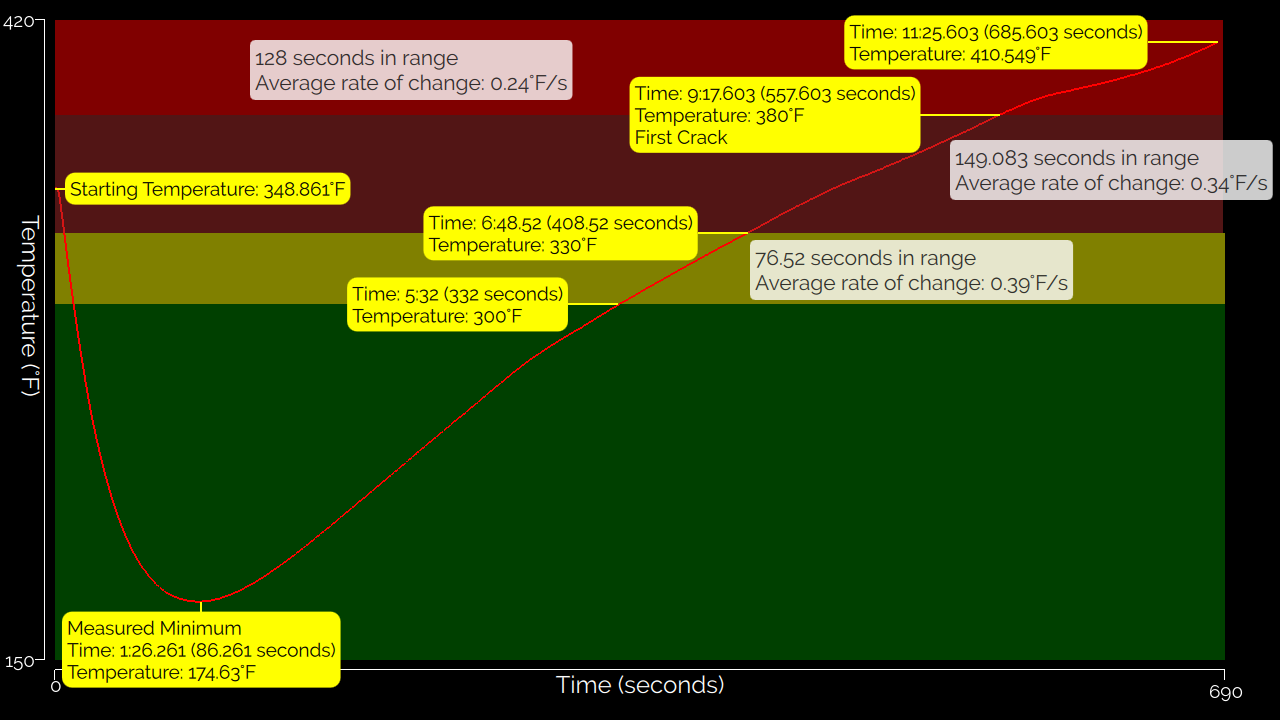What is Advanced Profile Roasting?
Recently I got an email from someone who came across the term “advanced roast profiling” and wanted to know what that means. It's an interesting enough question that I decided to share my thoughts on the matter here.

I think that most roasters greatly underestimate the power of profile roasting as a discipline. It potentially goes quite a bit deeper than what anybody is currently doing so what exactly constitutes advanced profile roasting is going to change as the relevant technologies improve and as the scientific underpinnings are more fully explored, but for now I'd probably think of it like this.
Basic profile roasting is recording what you're doing and replicating it. Basic control and consistency is the foundation on which everything else is built. If you can't replicate your results, there's little point in doing the extra work to document what exactly you've done. This is the realm of the typical production roaster who isn't involved in the product development process. They have coffee, they have a roasting plan, and they get it roasted. That's important work. It's where most roasters should probably be spending the bulk of their time, but it's not very interesting. This is also where you find people who read a book or an article or watch a video or otherwise are following someone else's recommendation, and are pretty much taking the same approach or from a small set of approaches for all of their coffees without putting a lot of thought put into it. That's more concerning as it can be stifling from a skills development perspective. I've run into a lot of roasters who get lucky with something and settle on one approach as the right way to do things only to become hopelessly lost when they get a coffee that their approach doesn't work well with and they haven't developed any kind of conceptual framework to even start adapting how they're roasting coffee to get better results for what they have.
Moving on to a more intermediate level you gain the experience to bring some intentionality to the profiles and alter those to achieve broader goals like emphasizing body or acidity, getting something that's easy to pull a good espresso with, and understanding how to avoid common roasting defects. It's developing an appreciation that what's best for one coffee is not necessarily what's best for a different coffee and being willing to use different roast levels, different timings within temperature ranges, and putting the sensory experience with the coffee first. I'd probably put roasting for basic blend development here as well. At this level it's possible to do very good product development work, but skill with green coffee selection can still mask a lack of roasting skills. Indeed, I know of roasting companies that are producing some very nice coffees despite only roasting everything to a single profile, and they get away with that because they're sourcing green coffee with that constraint in mind. It's working for them from a business perspective and they have happy customers so I'm not going to be dismissive of that approach even if it's not one that I would choose myself.
At a more advanced level, it's possible to optimize on more specific properties: roasting to enhance or diminish specific acids, roasting for particular solubility targets, understanding how smaller changes in more narrow ranges of the roast are likely to impact specific flavor expressions. It's taking advantage of an understanding of the underlying network of chemical reactions that happens during roasting. This also comes into play with coffees that are more challenging to roast. Taking a coffee that maybe should have been kicked out during green sourcing and figuring out how to best use that coffee once you have it. At this level, developed profiles are likely to be very different from one coffee to the next, but these differences are all intentional and based in the potential of the green coffee and the intended use for the roasted coffee.
Profile roasting can go beyond all of this as well, but quite a bit of the potential for this discipline requires either developing a broad experience over time or will be unlocked through future technological change. It's an exciting time to dig into this discipline as it's still relatively young with a lot of territory to explore and the tools are constantly getting both better and cheaper (read: more widely available). As the author of Typica, I find it particularly rewarding to be able to develop new profile roasting features that are immediately of practical use both in my own roasting business and for other roasters throughout the world.
 Typica: Software for Coffee Roasting Operations
Typica: Software for Coffee Roasting Operations